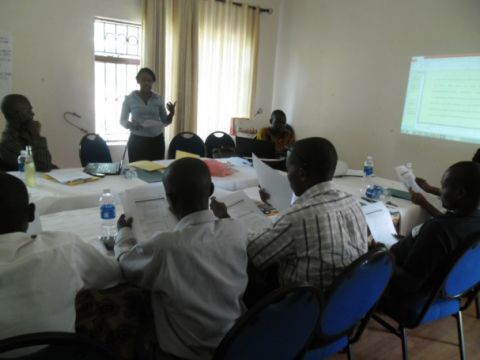Blog post written by Jessy Sing’ute, Research and Advocacy Officer at Vision Africa Regional Network (VAREN) on 15 March 2016.
As a way of uniting for a better future and celebrating the global advocacy in Water Action Month to celebrate World Water Day which falls on 22 March every year, EWP members’ Vision Africa Regional Network (VAREN) and ALEJO Community Services Project came together to raise awareness on water, sanitation and hygiene (WASH) issues in Zambia. These two partners brought together a range of civil society organisations (CSOs) working on advocacy in the WASH sector, and hosted a joint meeting on 14 Monday, 2016 in Mufulira township to discuss the human rights to water and sanitation. Our focus was on calling for the realisation the new Sustainable Development Agenda, particularly focusing on Goal 6 – to ensure availability and sustainable management of water and sanitation for all by 2030.
The need for the people of Zambia to have access to safe water and adequate sanitation, and to bridge the inequality gaps that exist in the country in accessing these services, was also explored during the meeting.
I took the lead role in explaining to participants why they need to demand for safe water and adequate sanitation from their government. Celebrating World Water Day without having the knowledge about its importance would be meaningless, so information is critical to ending the water and sanitation crises. I highlighted the importance of uniting together for water so as to not to leave any one behind and ensure that everyone has their right to water and sanitation realised.

Me presenting to the workshop on the importance of the human rights to water and sanitation
Key issues raised during the meeting
Water supply, hygiene education and sanitation are basic needs, which are central to development and the enjoyment of life. Safe water and sanitation are “human rights” and are important in the enjoyment of other rights, including the right to life, health, clean and safe environment and property – hence the need for people to realise these rights and demand for them.
One of the most fundamental dynamics of human rights, and consequently of a rights-based approach, is that every human being is a rights-holder and that every human right has a corresponding duty-bearer. In Zambia as a whole, the state/GRZ have been given an obligation to respect, fulfil and protect the rights of its citizens. The overall responsibility for meeting human rights obligations in this case rests with the State. Therefore as a result, a rights-holder is entitled to rights, to claim rights and to hold the duty-bearer accountable.
As members of End Water Poverty which is a coalition of more 300 CSOs globally, we have created an important platform for the local citizenry to demand for their rights from the duty bearers. We are doing this by appending their signatures on a petition calling on the government and decision-makers to keep the promises they have made locally, nationally, regionally and globally to give people safe water and adequate sanitation. Words alone are not enough – what is needed is action! These promises must be kept to bring an end to the water and sanitation crises in the country. Our country needs to a model for water and sanitation in the region as it has a lot of water bodies.
10,000 thousand signatures will be collected from different parts of the country to signify the need for change from the people.
Our core message
It is of critical importance that governments are pushed to achieve our new ambitious agenda, particularly targeting those most in need. We must ensure we see the change we want in the world. Inequality must end and the most marginalised and vulnerable must not suffer. WASH must be THE priority!
Now is the time to ensure the vulnerable and marginalised groups are not left behind. Improved water and sanitation for all will make early successes and sustainable progress possible across so many of the Global Goals, and truly end inequality. It is absolutely vital that we engage with the government at the national level so that they represent our voices in global discussions and make realistic plans to allocate enough resources to the WASH sector.
Clear plans and well-targeted resources are needed from both the government and the private sector to ensure the human rights on water and sanitation are realised by 2030.
We stand united! This joint workshop was an important step in our advocacy campaign for Water Action Month to empower people to hold government responsible. We will make our voices heard!